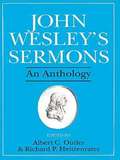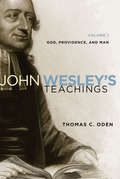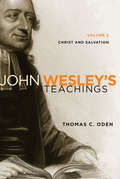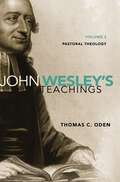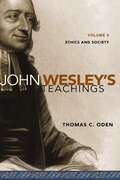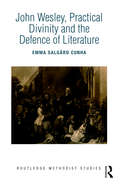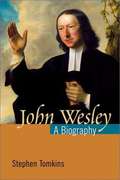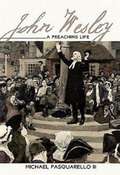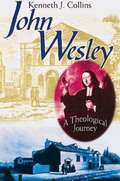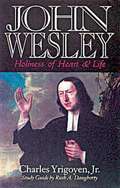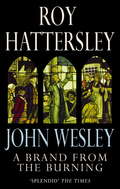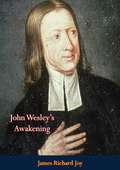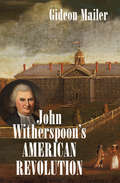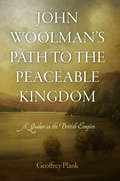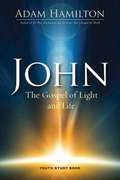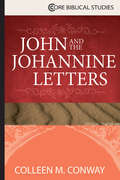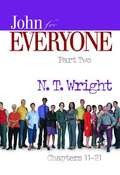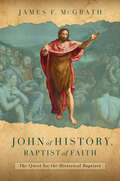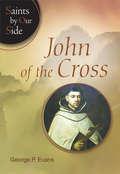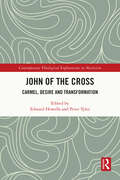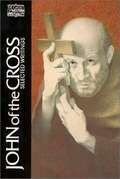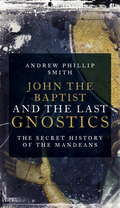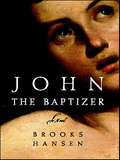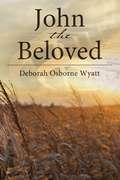- Table View
- List View
John Wesley's Sermons: An Anthology
by Albert C. OutlerAdapted from Albert Outler's 4-volume text The Works of John Wesley, this anthology of 50 of Wesley's finest sermons. Arranged chronologically with introductory commentary by Richard Heitzenrater.
John Wesley's Teachings, Volume 1
by Thomas C. OdenThe first presentation of John Wesley's doctrinal teachings in a systematic form that is also faithful to Wesley's own writings in ebook format. Wesley was a prolific writer and commentator on Scripture, yet it is commonly held that he was not systematic or internally consistent in his theology and doctrinal teachings. On the contrary, Thomas C. Oden intends to demonstrate here that Wesley displayed a remarkable degree of consistency over sixty years of preaching and ministry. The book helps readers to grasp Wesley's essential teachings in an accessible form so that the person desiring to go directly to Wesley's own writings (which fill eighteen volumes) will know exactly where to turn. This volume focuses on Wesley's doctrinal teaching. Other volumes in this series deal with his ethical and pastoral care teachings.
John Wesley's Teachings, Volume 2: Christ and Salvation
by Thomas C. OdenThe first presentation of John Wesley's doctrinal teachings in a systematic form that is also faithful to Wesley's own writings in ebook format. Wesley was a prolific writer and commentator on Scripture, yet it is commonly held that he was not systematic or internally consistent in his theology and doctrinal teachings. On the contrary, Thomas C. Oden intends to demonstrate here that Wesley displayed a remarkable degree of consistency over sixty years of preaching and ministry. The book helps readers to grasp Wesley's essential teachings in an accessible form so that the person desiring to go directly to Wesley's own writings (which fill eighteen volumes) will know exactly where to turn.
John Wesley's Teachings, Volume 3: Pastoral Theology
by Thomas C. OdenJohn Wesley’s Teachings is the first systematic exposition of John Wesley's theology that is also faithful to Wesley's own writings. Wesley was a prolific writer and commentator on Scripture—his collected works fill eighteen volumes—and yet it is commonly held that he was not systematic or consistent in his theology and teachings. On the contrary, Thomas C. Oden demonstrates that Wesley displayed a remarkable degree of internal consistency over sixty years of preaching and ministry. This series of 4 volumes is a text-by-text guide to John Wesley’s teaching. It introduces Wesley’s thought on the basic tenets of Christian teaching: God, providence, and man (volume 1), Christ and salvation (volume 2), the practice of pastoral care (volume 3), and issues of ethics and society (volume 4). In everyday modern English, Oden clarifies Wesley’s explicit intent and communicates his meaning clearly to a contemporary audience. Both lay and professional readers will find this series useful for devotional reading, moral reflection, sermon preparation, and for referencing Wesley’s opinions on a broad range of pressing issues of contemporary society.
John Wesley's Teachings, Volume 4: Ethics and Society
by Thomas C. OdenTimeless Teachings of John Wesleyfor the Modern-Day Christian John Wesley’s Teachings is the first systematic exposition of John Wesley's theology that encompasses all of his writings. Wesley was a prolific writer and commentator on Scripture—his collected works fill twenty-four volumes—and yet it is commonly held that he was not systematic or consistent in his theology and teachings. On the contrary, Thomas C. Oden demonstrates that Wesley displayed a remarkable degree of internal consistency over sixty years of preaching and ministry. This series of four volumes is a text-by-text guide to John Wesley’s teaching. It introduces Wesley’s thought on the basic tenets of Christian teaching: God and providence (volume 1), Christ and salvation (volume 2), the practice of pastoral care (volume 3), and issues of ethics and society (volume 4). In everyday modern English, Oden clarifies Wesley’s explicit intent and communicates his meaning clearly to a contemporary audience. Both lay and professional readers will find this series useful for devotional reading, moral reflection, sermon preparation, and for referencing Wesley’s opinions on ecological recovery, moral relativism, enthusiasm, catholicity, experience, paradise, final justification, providence, and countless others.
John Wesley, Practical Divinity and the Defence of Literature (Routledge Methodist Studies Series)
by Emma Salgård CunhaJohn Wesley (1703–1791), leader of British Methodism, was one of the most prolific literary figures of the eighteenth century, responsible for creating and disseminating a massive corpus of religious literature and for instigating a sophisticated programme of reading, writing and publishing within his Methodist Societies. <P><P>John Wesley, Practical Divinity and the Defence of Literature takes the influential genre of practical divinity as a framework for understanding Wesley’s role as an author, editor and critic of popular religious writing. It asks why he advocated the literary arts as a valid aspect of his evangelical theology, and how his Christian poetics impacted upon the religious experience of his followers.
John Wesley: A Biography
by Stephen TomkinsThe life and work of John Wesley (1703-1791) have had an enormous influence on modern Christianity, including his role as founding father of the Methodists, now 33 million strong worldwide. In this lively new biography journalist Stephen Tomkins narrates the story of Wesley's colorful and dramatic life for a new generation. Writing with verve and a light, sure touch, Tomkins follows Wesley from his childhood at Epworth rectory through his schooling and university career at Oxford to his mission to Georgia, his conversion in 1738, and finally his life as a religious leader in England. Preaching in numerous villages, towns, and cities, Wesley and his followers faced intense and savage persecution, but their missions were also accompanied by extraordinary phenomena such as convulsions, laughter, and healings. In the course of his compelling narrative Tomkins examines Wesley's relationships with key people in his life, including his powerful and austere mother, Susanna, and his hymn-writing brother, Charles. Tomkins also explores key issues in Wesley's life, such as his renunciation of wealth and his attitude toward women, concluding with an assessment of Wesley's ongoing influence both in his own country and abroad. Superbly crafted, grounded in thorough research, and published in the 300th year of Wesley's birth, this book will appeal to students of Wesley, people from the Methodist tradition, and general readers interested in church history.
John Wesley: A Preaching Life
by Michael Pasquarello IIIThat John Wesley was not a systematic theologian is a point frequently made. Yet if that be the case, what kind of theologian was he? To look at his literary output over the course of his long life and ministry is to recognize the central role that sermons played. Thus, claims Michael Paquarello, Wesley was a homiletical theologian, one for whom the Word preached was the core means of reflecting on and understanding the meaning of the Gospel.In this "preaching life" of Wesley Pasquarello places Wesley's sermons in the larger religious, political, and intellectual world of their eighteenth-century context. Neither a biography nor an intellectual history, it is a homiletic history, one that both uses the details of Wesley's milieu to build a framework for understanding his sermons, and that illumines the practical wisdom embodied in the content, form, and style of Wesley's preaching. John Wesley: A Preaching Life vividly portrays the centrality of Wesley's preaching to the religious revival that transformed eighteenth-century England.
John Wesley: A Theological Journey (The\works Of John Wesley Ser.)
by Kenneth J. CollinsJohn Wesley: A Theological Journey has been nominated for a Wesleyan Theological Society Book Award. Abingdon Press would like to congratulate Kenneth Collins on this honor. John Wesley remains a seminal figure, not only for "the people called Methodist, " but also within the larger Protestant tradition. Understanding his theology is a requirement for understanding the development of the Western Christian tradition in the modern period. In recent years much work has been done to grasp the intricacies of Wesley's theology. However, most of this work has been thematic in organization, studying Wesley's thought according to a topical or systematic outline. The weakness of this approach, argues Kenneth J. Collins, is that it fails to demonstrate the evolution and changes of Wesley's theology. What is called for is a historical presentation--one that examines the development of Wesley's theology across the span of his long and eventful theological career. Collins thus provides a chronological presentation of the development of Wesley's theology. Drawing on an extensive examination of the primary sources, and demonstrating an intimate knowledge of the different contexts and social locations in which Wesley's theology took place, John Wesley: A Theological Journey will be necessary reading for anyone wishing to understand the broad scope of the Methodist leader's theological development and contribution.
John Wesley: Holiness of Heart and Life
by Charles YrigoyenJohn Wesley: Holiness of Heart and Life is a six-week study on John Wesley, the major themes of his theology, the spread of Wesleyanism to North America, and renewal in the Wesleyan tradition. Chapters include reflection questions. The Study Guide offers step-by-step plans for each session.
John Wesley: The Life of John Wesley
by Roy HattersleyJohn Wesley led the Second English Reformation. His Methodist 'Connexion' was divided from the Church of England, not by dogma and doctrine but by the new relationship which it created between clergy and people. Throughout a life tortured by doubt about true faith and tormented by a series of bizarre relationships with women, Wesley kept his promise to 'live and die an ordained priest of the Established Church'. However by the end of the long pilgrimage - from the Oxford Holy Club through colonial Georgia to every market place in England - he knew that separation was inevitable. But he could not have realised that his influence on the new industrial working class would play a major part in shaping society during the century of Britain's greatest power and influence and that Methodism would become a worldwide religion and the inspiration of 20th century television evangelism.
John Wesley’s Awakening
by James Richard JoyJohn Wesley (1703-1791) was an English cleric, theologian and evangelist who was a leader of a revival movement within the Church of England known as Methodism. The societies he founded became the dominant form of the independent Methodist movement that continues to this day.“The old-time, narrow, sectarian view of Wesley as the Founder of Methodism, and therefore the patron-saint and peculiar property of one denomination, dispraised and undervalued by all others, has largely given way to the world-view which ranks him with the major prophets, apostles, and saints of all time. His tablet is in Westminster Abbey, with the memorials of monarchs, statesmen, empire-builders, philanthropists, and men of letters. The scholars of two continents have begun to recognize him as belonging in the grand succession of Saint Paul, Saint Augustine, Martin Luther, and John Wesley—the great awakeners of the human soul—themselves awakened by the touch of God.“This book owes its existence to a call for something which should present in brief compass and in non-theological language the personality and work of John Wesley, with special reference to the spiritual experience at Aldersgate, which marked the turning-point in his career.”
John Witherspoon's American Revolution (Published by the Omohundro Institute of Early American History and Culture and the University of North Carolina Press)
by Gideon MailerIn 1768, John Witherspoon, Presbyterian leader of the evangelical Popular party faction in the Scottish Kirk, became the College of New Jersey's sixth president. At Princeton, he mentored constitutional architect James Madison; as a New Jersey delegate to the Continental Congress, he was the only clergyman to sign the Declaration of Independence. Although Witherspoon is often thought to be the chief conduit of moral sense philosophy in America, Mailer's comprehensive analysis of this founding father's writings demonstrates the resilience of his evangelical beliefs. Witherspoon's Presbyterian evangelicalism competed with, combined with, and even superseded the civic influence of Scottish Enlightenment thought in the British Atlantic world.John Witherspoon's American Revolution examines the connection between patriot discourse and long-standing debates--already central to the 1707 Act of Union--about the relationship among piety, moral philosophy, and political unionism. In Witherspoon's mind, Americans became different from other British subjects because more of them had been awakened to the sin they shared with all people. Paradoxically, acute consciousness of their moral depravity legitimized their move to independence by making it a concerted moral action urged by the Holy Spirit. Mailer's exploration of Witherspoon's thought and influence suggests that, for the founders in his circle, civic virtue rested on personal religious awakening.
John Woolman's Path to the Peaceable Kingdom
by Geoffrey PlankThe abolitionist John Woolman (1720-72) has been described as a "Quaker saint," an isolated mystic, singular even among a singular people. But as historian Geoffrey Plank recounts, this tailor, hog producer, shopkeeper, schoolteacher, and prominent Quaker minister was very much enmeshed in his local community in colonial New Jersey and was alert as well to events throughout the British Empire. Responding to the situation as he saw it, Woolman developed a comprehensive critique of his fellow Quakers and of the imperial economy, became one of the most emphatic opponents of slaveholding, and helped develop a new form of protest by striving never to spend money in ways that might encourage slavery or other forms of iniquity.Drawing on the diaries of contemporaries, personal correspondence, the minutes of Quaker meetings, business and probate records, pamphlets, and other sources, John Woolman's Path to the Peaceable Kingdom shows that Woolman and his neighbors were far more engaged with the problems of inequality, trade, and warfare than anyone would know just from reading the Quaker's own writings. Although he is famous as an abolitionist, the end of slavery was only part of Woolman's project. Refusing to believe that the pursuit of self-interest could safely guide economic life, Woolman aimed for a miraculous global transformation: a universal disavowal of greed.
John Youth Study Book: The Gospel of Light and Life (John series)
by Adam HamiltonThe Gospel of John is the most deeply spiritual of the four gospels. It includes some of the loftiest and most loved verses in all the Bible: "And the Word became flesh…," "For God so loved the world…," "You who are without sin cast the first stone…," "I am the resurrection and the life…," "I am the way, and the truth, and the life." The writing is filled with rich images and profound truths, but John notes that his aim in writing the gospel is that his readers will not only believe in Jesus Christ, but that they "may have life in his name."Join Adam Hamilton and experience a season of spiritual growth and life-changing renewal while exploring the major themes of John while reading the entire Gospel of John.Everything needed to conduct a six-session study of the Gospel of John including current examples that have meaning to young people grades 6-12. Can be used with the adult-level DVD.
John and Betty Stam: Missionary Martyrs
by Vance ChristiePart of the Heroes of The Faith series, this is the biography of John and Betty Stam martyred in China in 1934.
John and the Johannine Letters (Core Biblical Studies)
by Colleen M. ConwayWhile the book necessarily includes discussion of key concepts in Johannine scholarship (e.g., the existence or not of a distinctive Johannine community, questions regarding the gospel's sources and redactional layers), it also takes into account more recent developments in New Testament studies. It includes gender related issues with influence by postcolonial approaches as well as the influence of the Gospel's socio-political context in shaping its Christology and theology. Chapters focus on the different approaches to the Johannine texts and view the Gospel and letters through the lens of each respective approach. Chapters also encourage observation and open with a brief scripture reading assignment, followed by guiding questions to help students understand the key questions and themes for each approach.
John for Everyone, Part 2: Chapters 11-21 (The New Testament for Everyone)
by N. T. WrightMaking use of his scholar's understanding, yet writing in an approachable and anecdotal style, Tom Wright manages to unravel the great complexity of the extraordinary Gospel of John. He describes it as "one of the great books in the literature of the world; and part of its greatness is the way it reveals its secrets not just to a high-flown leaning but to those who come to it with humility and hope." Wright's stimulating comments are combined with his own fresh and inviting translation of the Bible text.Tom Wright has undertaken a tremendous task: to provide guides to all the books of the New Testament, and to include in them his own translation of the entire text. Each short passage is followed by a highly readable discussion with background information, useful explanations and suggestions, and thoughts as to how the text can be relevant to our lives today. A glossary is included at the back of the book. The series is suitable for group study, personal study, or daily devotions.
John of History, Baptist of Faith: The Quest for the Historical Baptizer
by James F. McGrathStudies of the historical Jesus typically reduce John the Baptist to a subordinate role in the story of Christian origins. This meticulous historical study focuses on John himself, revealing his extensive and enduring influence. In the popular imagination, John the Baptist plays the supporting role of Jesus&’s unkempt forerunner. But meticulous historical study reveals his wide-reaching and enduring influence on the history of religion. The first study of its kind, John of History, Baptist of Faith sheds light on the historical John the Baptist and his world. James F. McGrath applies historical-critical methodology not only to the New Testament but also to the Mandaean Book of John, a holy text of the last extant gnostic sect. McGrath uses the teachings of John&’s pupil, Jesus, as a window into his mentor&’s beliefs. Along the way, he brings new clarity to questions of contention among scholars, such as John&’s use of immersion as a substitute for temple sacrifice. Bold in its claims yet careful in its method, John of History, Baptist of Faith lends fresh insight into John, Jesus, and their world. McGrath&’s pioneering monograph will challenge and intrigue students and scholars of the New Testament and Second Temple Judaism.
John of the Cross (SOS)
by George P. EvansSaint John of the Cross was a Carmelite priest, poet, theologian, spiritual director, and a religious leader. He became one of the world's foremost experts on making progress in faith, prayer, and love. Immersing himself in the writings of spiritual masters, John discovered how images can speak of the Christian’s efforts to follow Christ and seek union with God. Four images stand out: night and its darkness, a log tossed into a flame, a romantic relationship, and a mountain climb.
John of the Cross: Carmel, Desire and Transformation (Contemporary Theological Explorations in Mysticism)
by Peter Tyler Edward HowellsThis book explores the life and teaching of John of the Cross, the Spanish mystic who remains a major source of Western thought on spirituality, theology and mysticism. Leading academics discuss the importance and legacy of John from historical, theological, philosophical, pastoral, ecumenical, psychological and literary perspectives. The book focuses on his place in Carmel, his understanding of desire, and the role of transformation in his theology. Approaching John in the context of the late medieval mystical tradition, it offers a timely re-evaluation of his work and a significant reassessment of his relevance in the context of current debates.
John of the Cross: Selected Writings
by Kieran Kavanaugh John of the CrossThis volume contains carefully chosen texts that give a picture of the "essential" St. John of the Cross (1542-1591), a Spanish Carmelite. Included are selections from The Ascent of Mount Carmel, The Dark Night, and Spiritual Canticle.
John the Baptist and the Last Gnostics: The Secret History of the Mandaeans
by Andrew Philip SmithAre there still Gnostics and can their roots be chased back to John the Baptist?Among the casualties of the western intervention in Iraq and the recent activities of ISIS are the Mandeans of Southern Iraq. These peace-loving people are now fleeing to the west . They are the last Gnostics, the only surviving remnant of the ancient sects who taught the direct knowledge of God, created their own gospels and myths and were persecuted as heretical by the church in the second and third centuries. The Mandeans place weekly river baptisms at the centre of their religious life and the primary exemplar of their religion is none other than John the Baptist. What is the real history of this mysterious and long lived sect? Can the Mandean peoples really be traced back to the first century? And who was John the Baptist? This book follows the history of the Mandeans from their present plight back through their earliest encounters with the West, their place in Islamic counties, their possible influence on the Templars, back to their origins as a first century baptismal sect connected to John the Baptist and beyond.
John the Baptizer: A Novel
by Brooks HansenA vivid, moving, and unprecedented biographical saga of John the Baptist. Traditionally, John the Baptist is seen as little more than an opening act—“the voice crying in the wilderness”—in the great Christian drama. In presenting the epic of John’s life, novelist Brooks Hansen draws on an extraordinary array of inspirations, from the works of Caravaggio, Bach, and Oscar Wilde to the histories of Josephus, the canonical gospels, the Gnostic gospels, and the sacred texts of those followers of John who never accepted Jesus as Messiah: the Mandeans.Gripping as literary historical fiction, and fascinating as a diligent exploration of ancient and modern sources, this book brings to eye-opening life the richly textured world—populated by the magnificently sordid, calculating, and reckless Herods, their families, and their courts—into which both John and Jesus were born. John the Baptizer is a captivating tapestry of power and dissent, ambition and self-sacrifice, worldly and otherworldly desire, faith, and doubt.
John the Beloved
by Deborah WyattDespite being raised in a religion and culture that forbids secular music, John has always heard music where others simply hear sound. Entirely self-taught, John composes music that he hides from the world; music that has never been played out loud but exists only inside his mind. Then one day while working in the cornfield, John hears beautiful music coming from a nearby farmhouse. Entranced, he walks towards the music and through an open window sees a beautiful, young lady playing the piano. This chance encounter awakens within his heart the desire to hear his own music played. John places one of his compositions in an envelope along with a note and slides it under the door of the pianist.After a life of glamour, travel and music, acclaimed concert pianist, Elise finds herself facing a personal crisis entirely alone. Needing a quiet, peaceful place to recover and heal, Elise abandons her cosmopolitan life and retreats to the Indiana farmhouse she inherited from her grandparents. Broken-hearted and ill, Elise&’s days seem to be filled with darkness and depression until she receives a note and sheet music from a stranger. Intrigued, she plays the composition and finds it to be unique, unorthodox and beautiful. Because the music brings joy into her previously dark days, Elise writes a note in response and leaves it on her doorstep hoping the mysterious person will return and find it. Thus, begins a journey that will take both John and Elise down a path that neither expected to walk. In the days ahead, they will face moral and spiritual dilemmas and will have to answer the question: will they follow God&’s plan for their lives no matter how high the cost may be?Come: follow John and Elise on a musical journey that will either bring them the greatest heartache they have ever known or the greatest joy.
